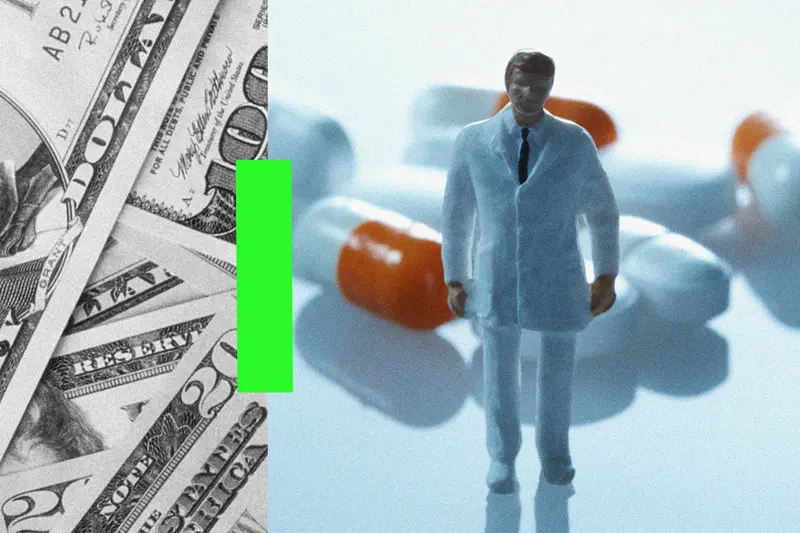A dozen years ago, a Santa Monica, California, pain doctor named Gerald M. Sacks emerged as one of the pharmaceutical industry’s top paid speakers — anointed to extol the virtues of a variety of drugs, even though several experts in pain medicine said they’d never heard of him.
His drug company haul had occurred largely under the radar until 2010, when ProPublica started digging into what the firms were paying physicians to deliver talks and consult on their pills. That’s when we consolidated the payments from seven companies, most of which had been forced by government settlements to make them public, in a database we called Dollars for Docs.
Sacks turned out to be a big winner, and we wrote about how little in his resume explained why. He was even a focus of an op-ed we wrote in the Los Angeles Times about how patients are often unaware of the relationships their doctors have with drug companies.
Nevertheless, companies continued to pay Sacks large sums. From 2015 to 2021, he received more than $2 million from companies to speak and consult on their behalf, including spending on travel and meals, federal data shows.
But last month — 12 years since we first wrote about him — Sacks’ puzzling role as one of the drugmakers’ chosen pain doctors took a different turn: Federal prosecutors allege he’d been paid to prescribe.
Sacks agreed to pay more than $270,000 to resolve allegations by the U.S. Department of Justice that he’d accepted kickbacks from drug companies Purdue Pharma and Depomed to prescribe their products. Purdue is the maker of OxyContin and pleaded guilty in 2020 to, among other things, conspiring to provide kickbacks to doctors. The Anti-Kickback Statute prohibits doctors from prescribing drugs in exchange for speaking or consulting payments from drug manufacturers.
From 2015 to 2018, Purdue paid Sacks more than $70,000 for speaking and consulting. Depomed, which changed its name to Assertio Therapeutics in 2018, paid him more than $285,000 for speaking and consulting from 2015 to 2018, according to the federal government’s Open Payments database. Neither Assertio nor its predecessor, Depomed, has been accused by the government of wrongdoing.
Sacks writes a few thousand prescriptions a year, including refills, to patients in the federal Medicare program. Among the tally in years past were hundreds of prescriptions for the drugs for which the government accused him of taking kickbacks.
Sacks denied wrongdoing in the settlement and did not return phone calls seeking comment. Neither Purdue Pharma nor Assertio returned emails seeking comment.
“Physicians are prohibited from accepting kickbacks designed to influence their decision making,” Deputy Assistant Attorney General Michael D. Granston said in a news release. “Adherence to this prohibition is especially crucial with regard to dangerous drugs like opioids.”
The allegations against Sacks relate to his prescribing of the drugs Butrans, Hysingla and OxyContin, made by Purdue, to patients on Medicare between December 2010 and October 2021. They also cite his prescribing of the drugs Gralise, Lazanda and Nucynta, made by Depomed, to Medicare beneficiaries in 2016.
Experts say the evidence is now overwhelming that there is a strong association between drug company payments and doctor prescribing. This link is worrisome, they say, because doctors should prescribe medications solely based on what’s best for the patient, not because they receive money from the company that makes a drug. Some prescription drugs may be more expensive or have greater side effects than cheaper or generic alternatives.
Today, the federal government collects information on payments from all drug and device makers in its Open Payments database. Researchers say such payments show that patients and regulators need to be on guard.
In a research article last month in the Journal of Health Politics, Policy and Law, the authors note it’s not just one study that found a troubling link between drug company cash and what doctors prescribe. “Every published, peer-reviewed study that has evaluated the association between payments and prescribing using a causal inference framework has found evidence that receipt of industry payments increases physicians’ prescribing,” they wrote. They call on a variety of parties, including doctors, the drug industry and regulators, to take action to reduce these conflicts.
Dr. Aaron Mitchell, one of the authors and an oncologist at Memorial Sloan Kettering Cancer Center, said the ever-growing list of research findings upends the presumption that payments to physicians, particularly small ones like meals, don’t influence doctors’ prescribing.
“The legal interpretation of a kickback has long been that industry payments and other transfers of value to physicians are OK as long as they don’t influence prescribing,” he said. “We now have overwhelming data that such payments do influence prescribing. In light of that we need to seriously reexamine the status quo.”
Mitchell suggested that regulators, like the Office of Inspector General of the U.S. Department of Health and Human Services, review their guidance related to industry payments and “be clear to everyone that these are going to be under increased scrutiny and increased risk of prosecution than they have in the past.”
The OIG’s Office of Counsel said in a statement that it “has long expressed concerns over the practice of pharmaceutical manufacturers providing anything of value to physicians in a position to make or influence referrals to manufacturers’ products.” The office issued a special fraud alert in 2020 that discussed the risks of speaker program payments to physicians and other practitioners by drug and medical device companies.
“OIG has pursued, and will continue to pursue, abusive financial relationships between pharmaceutical manufacturers and physicians,” the statement said.
In 2021, the most recent year for which there is publicly available data on payments to doctors, drug companies paid Sacks more than $84,000.












